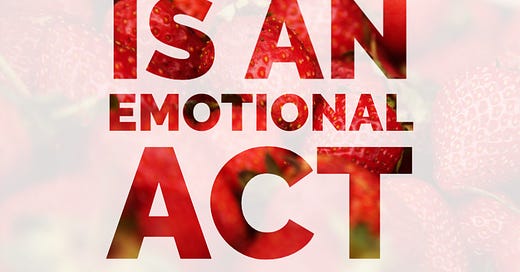I’m at Costco for my routine biweekly trek, that’s every-other week; I’m stupidly wealthy but even I can’t afford to go to Costco weekly. I pop into the walk-in produce freezer in search of strawberries.
This deep-winter Chicago location was packed with customers circling the goods — their presence pressured me to grab whatever I could and retreat before the vultures plucked it up. Despite the pressure, I stopped to read a label.
Costco provides both organic and conventional produce. The former for people who care about the environment (my wife), and the latter for penny-pinching Earth-haters.
I err toward frugality. However, on this shopping trip I wouldn’t get away with a couple cartons of inorganic strawberries — my wife tagged along. And after about 8-months of marriage, she has a spider-sense for Stanley-bullshit.
To avoid getting caught, I grabbed what I presumed to be the organic carton of strawberries and studied the packaging to verify. No where did I spy the USDA certified organic label.
That triggered my next thought: let’s see how much the organics are going for, but something genius interrupted my neural pathways. On the carton in bold white lettering was a brilliant piece of copy: “Responsibly grown.”
These two words made my decision. They ensured me that while these strawberries may have taken a few dozen pesticide showers, they remembered to get behind the ears and between the toes. This claim of responsible growth disarmed their organic competitors — sure, those strawberries were organic, but were they responsible?!
They knew their strawberries had an organic neighbor. They knew shoppers placed a premium on organic produce, since organic produce is superior to conventional.1 And they knew that an innocent, unverifiable claim such as ‘responsibly grown’ could trigger budget-sensitive shoppers to perform a re-balancing act, one that eased the anxiety that comes with choosing affordable, Earth-slaughtering produce.
And then I chucked, because game sees game. The copywriters who printed that dubious claim knew exactly how this would play out in my head. ‘Responsibly grown’ is a banal brand attribute, something I’ve discussed on this column before. It has no teeth.
Of course a farm will claim to work responsibly; would you ever shop for produce grown recklessly with wild abandon? And I chuckled doubly because in spite of my awareness of this gimmick, I still grabbed those strawberries — it worked. But why?
After reading this claim, I used my 3rd-grade-level logic to deduce that such statements provided no new information. I could not verify the claim in a reasonable amount of time; the organic strawberries remained organic, and these would remain... inorganic.
Unfortunately, that rational evaluation came after I made my decision. My first thought convinced me to buy, and it wasn’t a thought at all, it was a feeling.
After I saw ‘responsibly grown,’ I stopped worrying whether the extra six bucks in my pocket was humanity’s last bad choice. No, Stanley. Remember, these were grown responsibly.
The lesson here is clear: a purchase is an emotional act.
My feeling brain is much faster and far more convincing than my thinking brain. My feeling brain spurs me into action with happy neurochemicals; my thinking brain berates my feeling brain for doing stupid shit like a parent getting no where with her unruly teenager.
If we know which negative feelings our customers associate with our products and services, than we can lower barriers to purchase with our messaging. Now it needn’t be said, but just in case you haven’t read my other work, don’t lie.
Perhaps this berry farm grows their produce responsibly, and I hope they do — whatever irresponsible farming is, I want nothing to do with it. And while their statement technically worked, I think we should all take that extra step to produce facts, rather than claims, to help the customer sell themselves.
Thank you for reading and stay tuned to find out what my wife says after she realizes I brought two cartons of basic bitch strawberries into the house.
“Are Organic Foods Worth the Price?” Mayo Clinic, 2020. https://www.mayoclinic.org/healthy-lifestyle/nutrition-and-healthy-eating/in-depth/organic-food/art-20043880.




